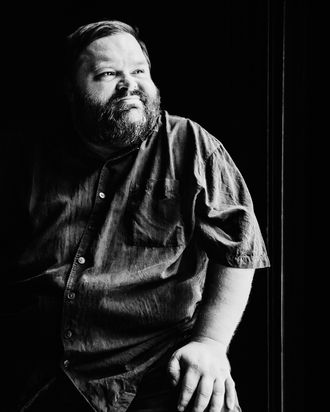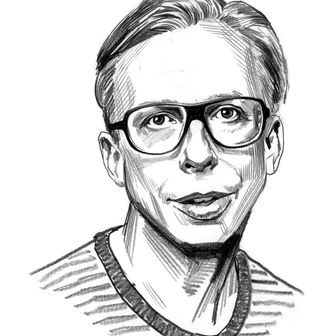
At the beginning of last year, Mike Daisey was ready to blow up. He had spent years nurturing a certain kind of intense but small-scale acclaim in the theater, performing haranguing, wistful monologues, which he never wrote down, to people who shared his core suspicions about the world — that we’re all ridiculous, that living requires some delusion, and that maybe we’re all just, in our semi-self-aware way, fucked. His critique of the mystical delights of consumer capitalism, The Agony and the Ecstasy of Steve Jobs, was adapted for “This American Life,” which made Daisey’s polymorphous, principled outrage at last scalable beyond the cabaret. But then it all blew up in his face. The public-radio broadcast was retracted by host Ira Glass, and Daisey’s self-styled profile as a higher-purpose grouser-crusader beaten to hell because he … well, fudged some parts. Misled. Made some stuff up — you know, in the service of his dramatic ends, or polemical ends, or artistic something.
Which made for a lot of drama. Over a year later, he’s hoping that episode’s all behind him, having apparently worked out the trauma (for what it’s worth, his dad was a shrink for veterans with PTSD) in a series of performances that might seem a bit like onstage therapy sessions (including one on journalism and one on lying), as well as auditing a J-school class at NYU called “The Fiction of Non-Fiction.”
“I’d never had an opportunity to be in a class where I’m on the curriculum,” Daisey tells me, sitting on a bench on the Brooklyn Heights Promenade, looking across to imperial Manhattan. It’s not too far from where he lives, in Carroll Gardens, and a place he often wanders when trying to puzzle out performances in his head. Daisey is a big man with a big head — a capacious ramshackle palace stuffed with fact, observation, humor, and lyrical ire. Or at least that’s what comes tumbling out onstage, where he sits, rubber faced, behind a table with notes and a bottle of water, gesturing and dabbing his inevitably sweaty forehead with a handkerchief, all the while holding forth on some indignity or hypocrisy or shaggy-dog irony or other — with the crowd usually transfixed. He’s great at it, reading the audience, surfing their moods, and giving them what they want to know — which was, at least to those who expected him to recount only things that actually happened to him, the problem.
By the time of the “This American Life” broadcast, Daisey been touring for over a year with The Agony and the Ecstasy, an investigation of his own ambivalent devotion to Apple — he still has an iPhone, and kept confusing his with mine — that developed new riffs and insights and anecdotes along the way. The excerpted version was a huge success—a rousing liberal-guilt two-step of flattering the audience by criticizing its complicity — and the show’s most popular podcast ever. But after it emerged that Daisey had embroidered parts of his story and then, worse, lied in the fact-checking process, Glass raked him over the coals. “If you get a chance to do it, you might not want to break up with your public-radio boyfriend on the air and then let him have the final cut of your interview,” Daisey says wanly.
Defiantly heroic in his own head, he never fully apologized, instead attempting a lonely quixotic defense of the higher purposes of art and a counter-critique of the concept of objectivity (even fans inclined to applaud his desire to make a difference squirmed at this). “I think it’s a weird thing that apology is actually like the politics of personal destruction—trying to force people to apologize as a way of dismantling them,” he says. “If I gave it too easily, I think I was really afraid it would not be enough. I was really afraid that all the work, all the emphasis on Apple, on the actual labor conditions, would evaporate.”
The affair also made him somewhere between slightly famous and slightly infamous — now, he tells me, his mere presence somewhere can instigate a tweet. And that profile is important enough to him that he can’t quite back away from it. Instead, he’s hoping to seal up the scandal behind a thick wall of words. On September 5, Daisey began a new 29-day-long cycle of stories — a different one every day, 44 hours total — at Joe’s Pub at the Public Theater, called All the Faces of the Moon. Among other things, it’ll explore Thomas Edison’s “attempt to sort of corporatize human discovery” and his war with Nikola Tesla over the development of the electrical grid; a bunch of stuff about Robert Moses; and what the publicity material calls “the secret history of New York.”
It’s also such an ambitiously (self-)punishing production that it’ll be virtually impossible to digest. “Not to show my hand too much or something,” he says, but building a new fortress of talk is “a very effective technique if you’ve just had a scandal. You submerge yourself in your work, and then when it’s time to do the show that everyone will judge you on, the one that all the reviewers will show up to, the last thing you want to do is give them something they can actually judge. It would be much better to give them something that is far too large for any of them to swallow.”
We walk down Montague Street to the restaurant Teresa’s for fried pierogi and coffee. He dabs his sweaty forehead, just like onstage, and pulls out what I at first take to be a pencil. But it turns out to be, upon inspection, a lacquered chopstick. He looks embarrassed when I ask him about it. “Man, I’m supposed to leave it in my pocket during interviews,” he says. “I actually have a little jar of them. When I was a kid, I would play with a pencil all the time. Then this will sound really weird. I transitioned from pencils to chopsticks, because when I would have a pencil, I would like to use unsharpened pencils, because I would stab myself in the hand with them, and they don’t balance right. After I wrote my first book, people would come up to me and would be like, ‘So you’re a writer. You aren’t going to write very much with that unsharpened pencil.’ This doesn’t sound like a joke a lot of people would make. Crazy numbers of people would make this joke. Every fucking day. I literally trained myself to switch to chopsticks from pencils because it’s weirder. No one says fucking anything, or they don’t notice it. They’re like, ‘Is that a baton? What the hell is going on over there?’ ”
*This article originally appears in the September 16, 2013 issue of New York Magazine.
*The headline on this story has been updated.


